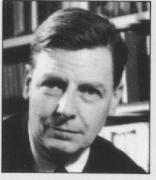|
|
||||||||||||||||||||||||
 |
Featured person
John Stewart
Recently added |
Frederick Gamble (c.1905 - 1986): |
||||||||||||||||||||||

|
| Frederick Gamble (John Pepper) |
Frederick, or simply Fred, Gamble, was one of the most important members of the editorial staff of the Belfast Telegraph, the largest-circulating newspaper in Ulster, known usually as simply the Telegraph or Tele. He was more widely known as John Pepper, under which name he wrote for many years a weekly column in the same newspaper, in particular pointing up idiosyncrasies of Ulster speech in a humorous way, though to those who know it, a highly accurate one. He published many books on foot of his column, which became best-sellers not just for their humour but their underlying essential accuracy.
Gamble made his career in the Telegraph very much from the base up, joining as a junior in 1921 when he was 16, rising to subeditor, senior subeditor, and during the Second World War he was air correspondent of the paper. After the war he spent some time working on newspapers in England, the Daily Express in Manchester, and the Daily Mirror in London; he was able to acquaint himself with those publications' approach to presentation and to build for himself a sound grasp of different typographical and graphics techniques, so that when in 1948 he returned to Belfast and the Telegraph, he came with a range of ideas and suggestions to a newspaper which still, for example, carried advertisements and not news on its front page, a policy dating back to its foundation in the nineteenth century, and had no finance section, no sports section, no features pages, and no bylines. Gamble was successful in changing all these editorial stances. The move to reporting "front page" news as literally that, came on October 1st, 1953.
His column as "John Pepper" ran for well over a quarter of a century and yielded several books. His particular penchant was for expressions which while perfectly grammatical, had amusingly unintended meanings, such as the lady who said of an article of clothing "it would have fitted me if I could've got it on" or the lady (perhaps the same lady; no-one knows, though he usually ascribed his cited sayings to ladies) who invited a friend to call on her one evening "as I'm baking in the oven". The concept of someone "trying to speak awful well-dressed" is an instantly recognisable Ulsterism which can be extremely difficult to explain in full even to highly proficient non-Ulster speakers and students of English. One of his books, John Pepper's Ulster-English Dictionary contains such entries as that clarifying the definition of the word "yet" (which Pepper spells "yit" to reflect the Ulster pronunciation) as an expression of time, not anatomy: "I fell into a hedge and there's thorns in me yit" ("yit" being a typical Ulster pronunciation of "yet" - in this context meaning "still"). Many of Pepper's books are to be found on the shelves of Ulster-native expatriates as reminders of their "own" speech; airport bookshops take care to stock them.
Gamble as newspaperman won respect and plaudits from colleagues: a former editor of the paper described him as "an outstanding journalist" with an exceptional range of talents and "enormous creative flair", with particularly an inspirational influence on his colleagues "by his energy and infectious enthusiasm". A columnist colleague paid tribute to his "fascination with the beauty, the colour and the humour of the North Irish speech", which encapsulates "a rich heritage of colourful language that defies category and most of the rules".
Gamble also found to write more serious fiction in the form of three psychological thrillers: A Man and a Half; My Coat is Travel-Stained; and The Frightened One (published 1956-1958). Also mastering language and in more serious vein, he produced the Belfast Telegraph's first in-house style guide.
Gamble, in the words of a longstanding (and admiring, as all were) colleague, was "a hard-nosed professional with a light sense of humour...often hidden behind a deceptive, sad countenance". It was said of him that while he criticised and praised where each was due, it was hard to tell the difference. According to one apparently true anecdote, he was stopped in the street and told by an interlocutor that the best thing he had seen in the Tele was his fish-and-chips supper. He might have replied by asking, that given the time of day, was his questioner late for the early shift or early for the late shift?
| Born: | c.1905 |
| Died: | 4 September 1986 |
| Richard Froggatt |
| Bibliography: Malcolm Brodie: The Tele: a history of the Belfast Telegraph; John Pepper's Ulster-English Dictionary; John Pepper's Complete Norn Iron Haunbook |


Home | Our Policies | Plaques | Browse | Search | Sponsors | Links | Help | Contact
Privacy & Disclaimer | Cookie Policy | Site Map | Website Design By K-Point
© 2024 Ulster History Circle








